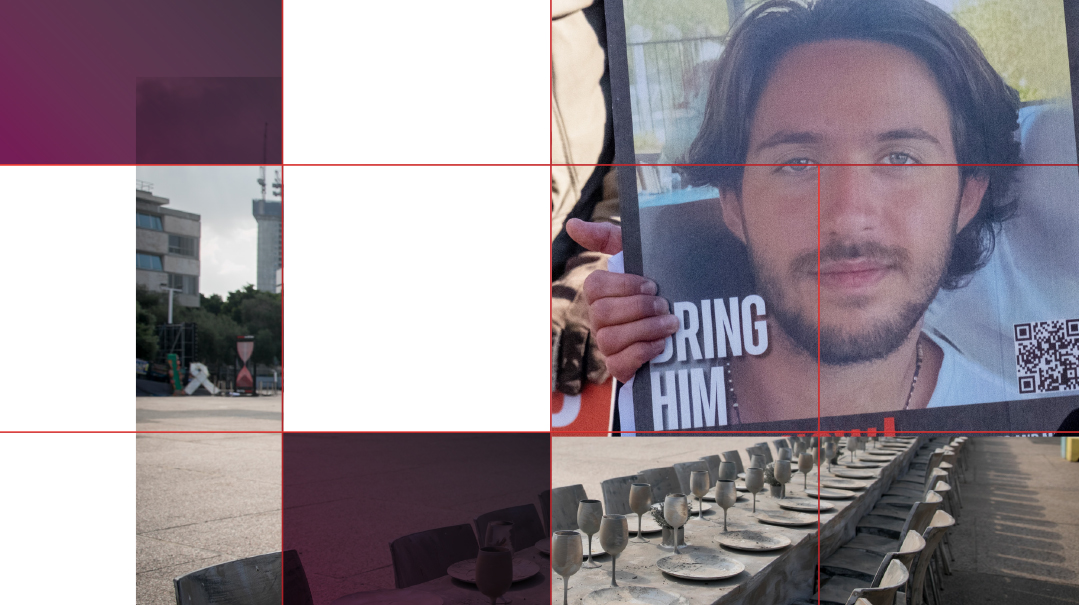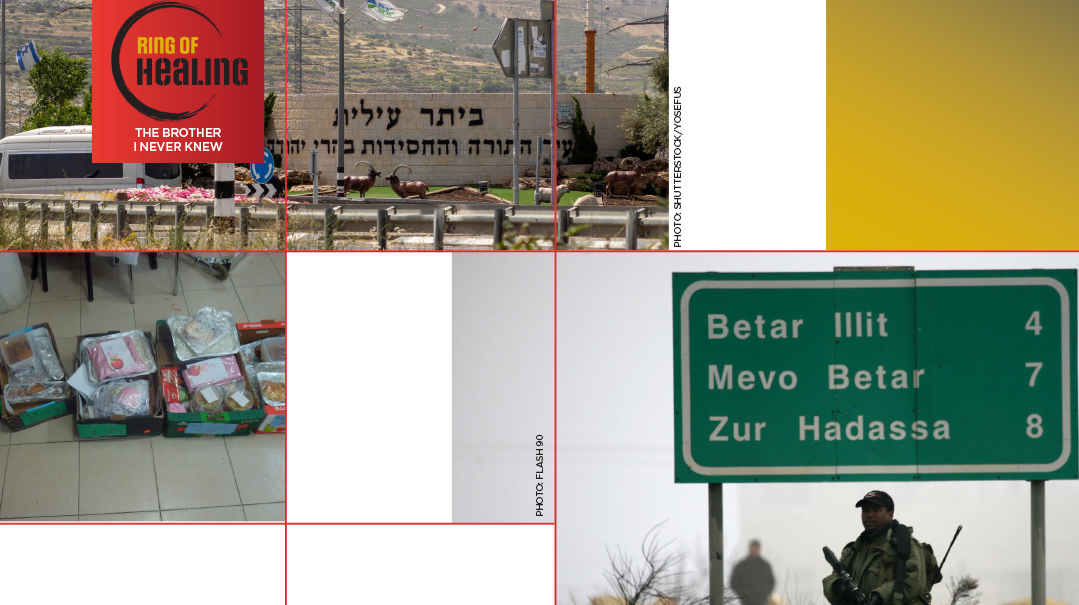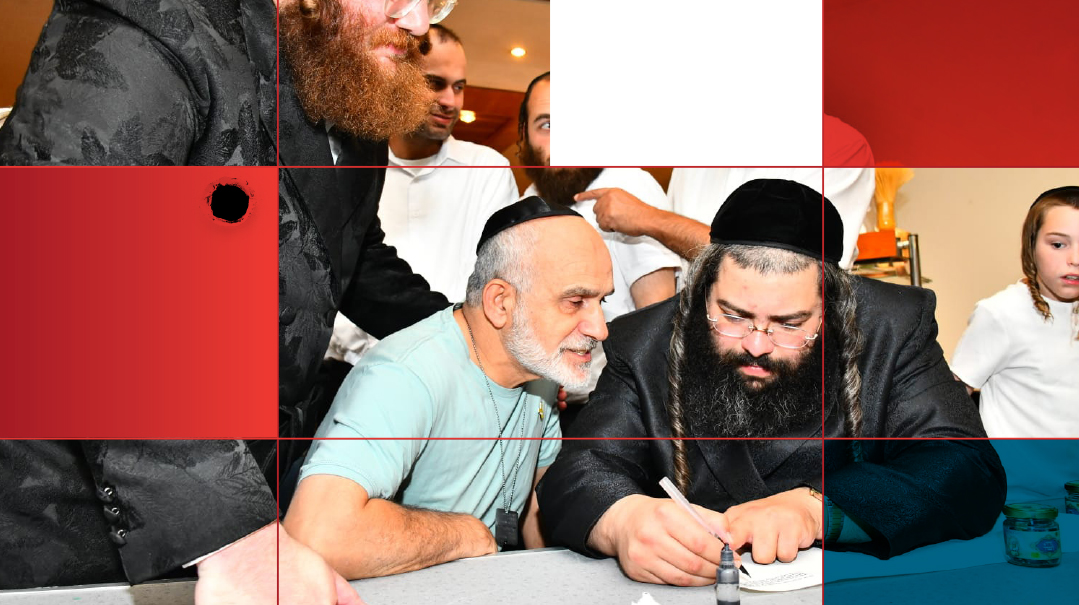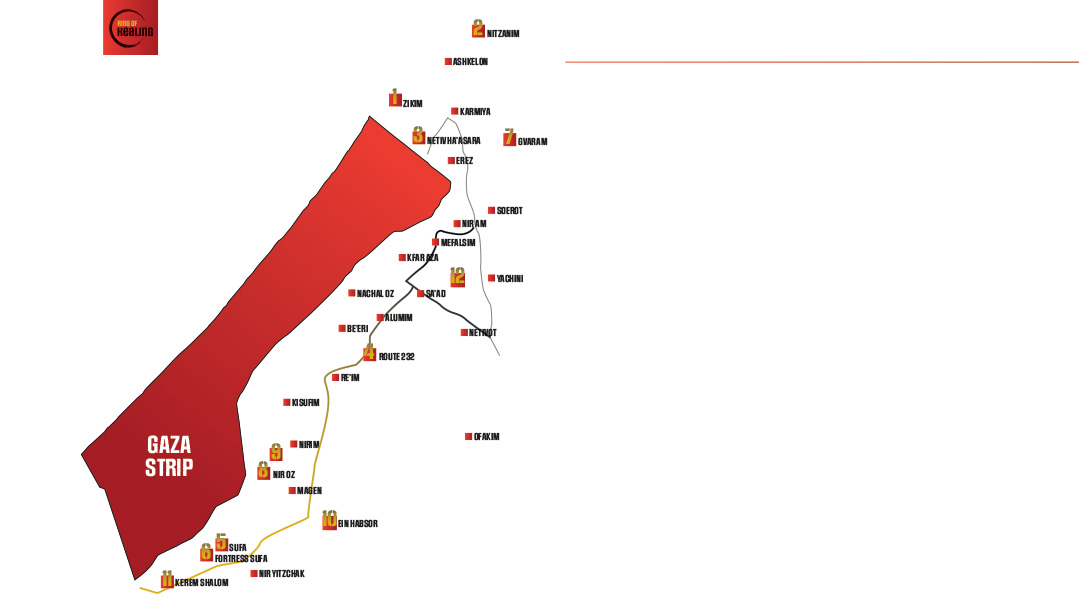The Brother I Never Knew: One Heart
| October 13, 2024So much more binds us than separates
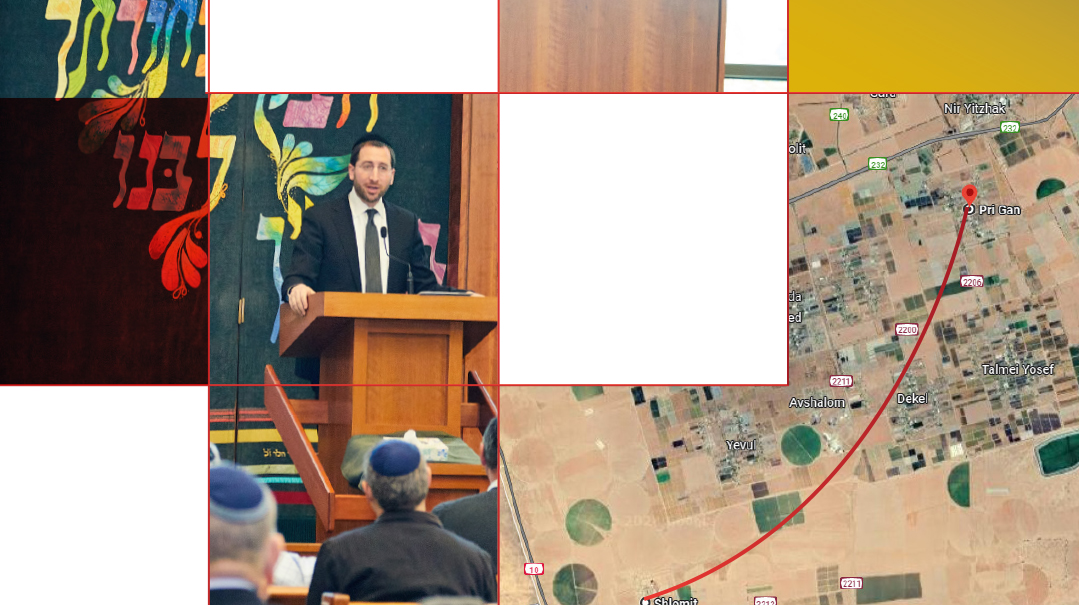
In the wake of the tragic events of October 7, unlikely yet remarkable human connections have emerged out of shared purpose and resilience. Through their collaboration, they developed new perspectives and understanding of the other’s world, and achieved something greater than themselves, as they learned to see beyond differences, bridging divides that once seemed insurmountable. Here are their stories.
When October 7 shattered the heart of a moshav in Israel, a shul in Woodmere reached out and welded these disparate communities together, transcending barriers of time and space to show that we’re one.
One Story
A
fter the horrifying events of last Simchas Torah, hundreds of members of Young Israel of Woodmere, where Rabbi Shay Schachter serves as the associate rabbi, expressed the desire to fly to Eretz Yisrael, to be present and help however they could. Despite a crammed schedule — Rabbi Schachter is also the rabbi at Yachad, the Orthodox Union’s international program for individuals with disabilities — Rabbi Schachter decided, with the staunch support of his wife, Rina, to represent their community, and he boarded a flight headed east.
He met so many individuals affected by the war — evacuees, widows, orphans, survivors, injured soldiers, bereaved parents, released hostages — each one a world of heartbreak. And to each one, Rabbi Schachter extended an invitation. No agenda. No photo ops. Just a simple offer.
“Come visit,” he urged. “We want you to meet your larger family, a family who love you and want to embrace you.”
And come they did. Critically wounded soldiers. Amputees. Released hostages. Parents of hostages. Parents of soldiers. Orphans arriving alone, no family members left to travel with them. Over the next 11 months, well over 50 men, women, and children received Young Israel of Woodmere-sponsored airline tickets.
Many families, including the Schachters, took turns hosting the visitors, but the entire 1,200-families strong membership of Young Israel, and the larger community of Woodmere, went out of their way to welcome the guests. People took time off work to drive the visitors to stores, museums, and amusement parks. Doctors in the neighborhood rewrapped bandages and replaced splints with casts (which were promptly signed). Every visitor who spoke in the shul about their experiences stood at the podium, gazing at an audience in the hundreds. It was balm to the traumatized men and women embraced by the community.
The ten host families, who at times opened their homes for weeks at a time, showered their guests with love and acceptance. The visitors enjoyed the unfamiliar beauty of Shabbos meals and closeness with religious families. Rabbi Schachter describes how in his home, former hostages interacted with his children on the living room couch. His wife Rina, aside from cooking and hosting, arranged for the women to shop for community-sponsored clothing at frum boutiques. Survivors, free from intense media scrutiny, unencumbered by constant requests for selfies, cherished the normalcy.
Rabbi Schachter, for his part, learned from the visits as well.
“We try to be sensitive and nonjudgmental, but the nuances of another’s experience can run so deep,” he reflects. “When I picked up one of the released hostages from the airport in New York, I innocently said, ‘Welcome to New York.’ The young woman’s reaction to my innocuous words was visceral, almost hysterical. I was stunned.
“After a few moments, she regained her composure and explained, ‘When I was driven into Gaza in the pickup truck, the first thing I was told by the terrorists was, ‘Welcome to Gaza.’ Your comment brought me back to that moment.’ ”
It was a reminder to Rabbi Schachter that we can never fully understand another person’s world. In the end, this former hostage bonded so deeply with his family that the Schachters hosted her for five weeks instead of five days.
The initial impetus for Rabbi Schachter and the Woodmere community’s invitation to survivors was their desire to do more than help from a distance.
“Identifying one story, one individual, one family, or one community is a more realistic way for ordinary individuals to have a meaningful impact,” Rabbi Schachter explains.
Bringing individual visitors to Woodmere allowed them to heal and gave everyone in the community a chance to show their support on a personal level.
“We wanted to make real, lifelong connections,” says Rabbi Schachter, who has been engaged in this work in the wake of October 7.
It all started during a visit to the Cramim Hotel on the outskirts of Jerusalem, where he forged a unique connection between the Young Israel of Woodmere and an entire Israeli community.
One Day
The serene agricultural community of Shlomit, a religious town established in 2014, is 700 meters (about half a mile) from the Egyptian border, seven kilometers from Gaza. Local farmers grow pineapples and lychees, tending gardens of sweet cherry tomatoes, among other vegetables. Dana Cohen, mother of six, and one of the pioneering families of the community, loves the beauty wrested from the dunes of the desert.
“When you come to this community, you see that we live in a blessed land, eretz zavat chalav udvash,” she says.
On October 7, Simchas Torah dawned with staccato gunshots piercing the quiet. In the first terrifying moments of confusion, Dana’s husband Aviad responded to a call for help from the nearby secular community of Pri Gan. He comforted his children, reassured his wife, and joined three friends from his town’s security detail to battle the terrorists.
Dana and her children huddled in their safe room, praying for Aviad’s safety. At 2 p.m., Dana glanced out the window and saw IDF representatives heading to her house — and she knew.
She rushed outside. Only four Jewish fighters from Shlomit died on October 7 — Aviad and three of his friends, killed defending their fellow Jews, heroes who spared Shlomit and Pri Gan from the vicious bloodbath that felled so many border kibbutzim, she was informed. Dana asked the men from the army not to enter her house until she had told the children herself about their father.
They waited outside while Dana gathered her children.
“Our home has always been happy. Our home will always be happy. Look at the pasuk hanging on the wall — ‘Hafachta mispedi l’machol li, pitachta saki vate’azreini simchah.’ Now let me tell all of you that Abba, your father, is a hero who was killed defending Jews. That hero gene is something all of you have from him. You are all heroes, and you will heroically choose life and live it with great joy, as Abba would have wanted.”
The shattered family couldn’t even hold a levayah and sit shivah amid the terrible chaos. Truckloads of casualties overwhelmed the chevra kaddisha at Machaneh Shurah, the headquarters of the IDF Rabbinate. It was another day before they could lay Aviad to rest, and Shlomit’s 82 households were evacuated from their town two days after the madness of the initial Hamas attack. The shocked widow and her children packed hastily and left for Aviad’s parents’ home in Moshav Berachiah. Far from their friends and the rest of the Shlomit community, the Cohens sat shivah for their beloved father.
Immediately after shivah, the Cohens joined the rest of Shlomit at the Cramim Hotel, where they’d been placed post-evacuation.
“I needed a safe place for my children, and I needed my community,” Dana says of her decision to relocate.
Thrust into this new setup, there was little time or space for healing. Groups of people kept visiting in a show of support, and one day, as one of Shlomit’s four widows, Dana was asked to speak to a small group of visitors.
Rabbi Schachter was a member of that group.
One Conversation
The summer before October 7, Rabbi Schachter, who grew up in a home strongly connected to Eretz Yisrael, had visited Shlomit with his family.
“The first thing I noticed was how serene it was,” he says.
He was impressed by the thriving desert town, the endless fields, quiet atmosphere, and beautiful homes.
On his post-October 7 visit, when he heard that the residents of Shlomit had evacuated to a hotel near Jerusalem, Rabbi Schachter wanted to visit people he already knew. He listened to Dana share her experience and the story of Aviad’s tragic, heroic death, and he was deeply moved.
“I know my husband was not killed for nothing. And I want to make the loss meaningful,” Dana explained to the assembled, noting that Aviad could have stayed in his safe room, but he chose to defend his fellow Jews. He gave his life for his people, Dana said, and we — “one soul in many bodies” — need to be united, now more than ever.
But knowing that her husband died a hero, saving countless lives, doesn’t take away the anguish. Distant from everything familiar, carrying the pain of her children in addition to her own, their day-to-day existence lacking structure, that particular week was grueling.
“I needed someone to help me,” Dana remembers.
After all the others had left, Rabbi Schachter remained. The two of them spoke, and overcome by emotion, Dana began to cry. Rabbi Schachter offered her words of comfort and an invitation, as he had done for so many others in distress.
“I don’t want to take,” she declared — but she did agree to exchange cell phone numbers.
One Visit
Two weeks later, Dana’s phone buzzed with a new message. It was Rabbi Schachter, his words warm and reassuring: We want you and your children to come visit our community. We would love to host you! Please come. We want to do anything to make you and your children happy.
Dana was touched, and she let Rabbi Schachter know she would consider his offer.
The days grew shorter, the chill in the air sharper, and the painful realization that Chanukah was nearing spurred Dana to contact Rabbit Schacher.
“It was too hard for us to stay,” she admits. “How could we light candles and enjoy this family chag without Aviad?”
Tickets were arranged for Dana and her six children, and it wasn’t long before their El Al plane was touching down at New York’s bustling John F. Kennedy International Airport.
“Their two-week stay transformed our family and our entire community,” Rabbi Schachter remembers. “We clearly saw the depth of their pain, were awed at their strength, and learned that even though we come from such different worlds, Jews can always connect deeply. In two weeks, so many people in the shul became incredibly close with the Cohens.”
People reached out, showing their support in the smallest details. One young mother asked for the Cohen children’s clothing sizes. She bought a sweatshirt for each child, and it became a family activity to Cricut a label for each sweatshirt. It was a small, sweet gesture that meant so much to the Cohen children.
“They came to our house two months after Aviad’s death,” explains Woodmere resident and hostess Stephanie Sokol. “It was so soon after their lives were turned upside down, but they were so resilient. Those Cohen kids love to smile.”
She watched how Dana interacted with her children: honestly, realistically, not trying to downplay their loss, but always tempered with a positive outlook. Dana supported her children in their grief, and also tried to give them hope and strength as the pain would repeatedly peak and subside.
“In Dana, I’ve found a close, lifelong friend in a totally unexpected place,” Stephanie says with admiration. “I know she puts one foot in front of the other for her children, keeping the memory of her husband alive.”
For Dana, the family visit to Rabbi Schachter’s community was the most meaningful thing to happen after the tragedy of Simchas Torah.
“His invitation saved me,” Dana says simply. “We felt the love of his family, of his community, the hugs, the concern, the kindness. Because of that, I didn’t fall into the black hole of sadness.”
In Israel, Dana didn’t know about the thousands of Jews on the other side of the world who cared so deeply for her family and the suffering in Eretz Yisrael. Now, in Woodmere, she did.
One Return
Leaving the American cocoon was wrenching, but a few months after their return to Eretz Yisrael and the Cramim Hotel, Dana faced an even more difficult task: leaving the hotel and returning to Shlomit.
She called Rabbi Schachter one night, her voice trembling with terror, as she worked through her dilemma. She was afraid to return home to Shlomit, but the government, no longer willing to continue paying for their hotel stay, had made it nearly impossible to remain.
Authorities declared Shlomit safe, but war was still raging. The possibility of sacrificing her children, so soon after losing her husband, shook her. Everyone else in the community was returning. Her children wanted return. But she was terrified. As an almanah with the burden of making decisions alone, Dana was torn between safety and the happiness of her children.
After pouring out her fears to Rabbi Schachter, he gently guided her. They needed to go back home, he said. She couldn’t afford to stay in the hotel, the children craved stability — and she would have to become the protector of the family. Dana reluctantly obtained a gun license and returned with her children to a place where every corner was filled with reminders of Aviad a”h: the garden he tended, the trees he loved, the house he worked on.
It took a long while for her to feel that the familiar surroundings, so riddled with trauma, could ever be “home” again. When they were finally settled in Shlomit, Rabbi Schachter visited with a group of shul members who, following the Cohens’ visit to Woodmere, wanted to see Shlomit and offer their help.
Shlomit residents said it would be meaningful if the New Yorkers planted a garden in their town, symbolizing hope for rebirth, the rebuilding of their lives, and as the group followed the gardener’s instructions on planting saplings, Dana and three other almanos invited Rabbi Schachter into their homes.
“Dana said, ‘Come and make a brachah in our home, because you have brought so much brachah into it,’ ” Rabbi Schachter remembers. “I went in, and I made a brachah — but I also felt such incredibly overwhelming brachah.”
On a subsequent visit, Rabbi Schachter introduced Dana to the team of IDF rabbanim from the chevra kaddisha at Machaneh Shurah.
“These compassionate tzaddikim are the ones who cared for your husband,” Rabbi Schachter told her.
Overwhelmed with gratitude, Dana said, “I need to thank you. As I was driving to the levayah, I genuinely felt as if my husband was being brought to his wedding with HaKadosh Baruch Hu. I must thank you for being the warmhearted people who attended this very sacred chuppah and volunteered to walk him down the aisle.”
After the infiltration and massacre, months of nomadic existence, multiple trips to America, and then an altered reality, Dana had had precious little time for any sense of closure. This meeting helped give her some of that, and she was so grateful to Rabbi Schachter, a lifeline of support and compassion since they met.
Because even with belief, there are questions.
“Rabbi Schachter is a talmid chacham,” Dana says. “He is a sensitive rabbi. He understands. When I have questions — both practical and in emunah — he gives me chizuk. I meet a lot of people, and many want to hear my story. But Rabbi Schachter really cares.”
One Dance
IN March, 138 days after October 7, the families had returned to Shlomit, and there was a gaping emptiness where four beloved fathers once lived. In addition to providing the grieving families basic assistance and emotional support, Rabbi Schachter offered the ultimate gift — an eternal memorial.
“We don’t have a real building for a shul in Shlomit — only a few trailers,” Dana explains. “Rabbi Schachter is helping us build a shul that will be dedicated in memory of the four kedoshim.”
“What better way to celebrate and commemorate Aviad’s heroic life?” Rabbi Schachter says.
Reflecting on the past year, memories unspooling in a tangled skein of hopes and fears, Rabbi Schachter says, “I never knew communities could connect to one another so profoundly. To see the pain and joy of an individual, of a single family, from so close, emphasizes the loss of the klal.”
“I never knew this meaning of Hashem natan, Hashem lakach,” Dana says. “My personal journey this year has been so painful, but when Hashem takes, He also sends us people who give us strength, who make us feel loved and cared for. I lost so much, and I also gained.”
This Simchas Torah, two communities, separated by time and space, will celebrate together.
Dana will hold on to Aviad’s memory as she watches her children dance in the trailers under Shlomit’s star-strewn sky.
And in the stately Young Israel of Woodmere, Rabbi Schachter will clasp a sefer Torah draped in a special white mantel dedicated by the community, with blue embroidery reading “Aviad Gad Cohen” shimmering as they dance.
One bittersweet dance, joy and sorrow interwoven, celebrating the connection forged in the aftermath of last Simchas Torah’s shattering blow. Two communities, united by tragedy, now one.
(Originally featured in Mishpacha, Issue 1033)
Oops! We could not locate your form.

